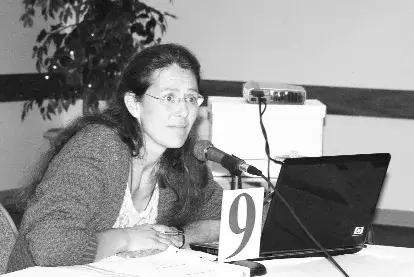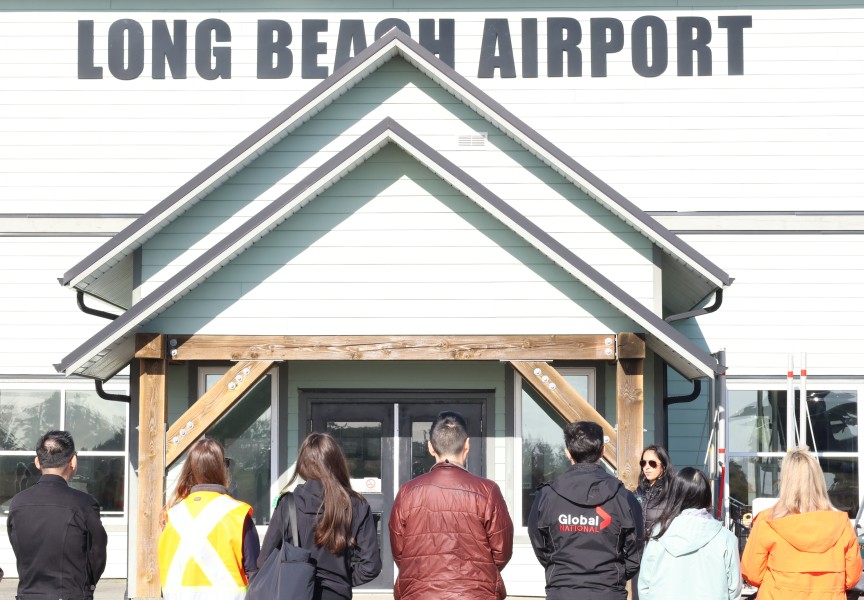From overlaps to management, land was the main topic of discussion at the latest Nuu-chah-nulth Tribal Council (NTC) treaty planning meeting held Sept. 18 at Tin Wis Resort.
Saya Masso welcomed visiting delegates on behalf of Tla-o-qui-aht Ha’wiih, and elder Levi Martin said a prayer to open proceedings. This was followed by a moment of silence in respect for those who have recently passed on.
NTC Vice President Michelle Corfield quickly got down to business by asking for a motion to have the agenda and minutes from previous meetings adopted before she was to deliver her Ha’wilth patak Nuu-chah-nulth-aht update.
Carla Point, Hesquiaht negotiator, expressed concern that the minutes were not getting out early enough for thorough review. Corfield assured the table that treaty manager Celeste Haldane would ensure the isolated motions would get out to delegates at least a day before future treaty planning meetings.
Mike Maquinna, Mowachaht/Muchalaht Tyee Ha’wilth and chief negotiator, asked about the progress of boundary disputes between member nations.
According to Corfield, a great deal of work on overlaps has been accomplished by several Nuu-chah-nulth First Nations over the summer; however, there are some tribes that have yet to work out solutions to their boundary concerns.
Maquinna said work with Hesquiaht and other neighbors on boundary issues has been good from Mowachaht/Muchalaht’s perspective. Corfield added that Ahousaht has also made progress with neighbors.
Point noted that First Nations were under-funded for treaty this year, and work, like boundary resolution, will take a lot of resources.
In her report from her nation, Point said she was appointed by Hesquiaht Ha’wiih as treaty negotiator on July 7.
“We’ve worked on improving communication with muschim using traditional approaches,” she said, adding they engage their people by going door-to-door and having community gatherings.
Hesquiaht, she said, is on track with its work plan and has been meeting regularly with its neighbors Ahousaht and Mowachaht/Muchalaht to settle boundary issues.
Masso said Tla-o-qui-aht developed a referral process whereby they enforce their government-to-government relationship. TFN is pushing for a service agreement with respect to water and other resources/services.
Cosmos Frank, standing with a small delegation from Ahousaht, reported they were there only to observe; that treaty issues needed to be worked out at Ahousaht before they could take a more active part in meetings.
Corfield said it was a sad day for Canada. That day it was one of the four nations that voted against the United Nations Declaration on the rights of the world’s indigenous peoples. The United States, Australia and New Zealand also voted against the declaration, calling it unfair because it would give indigenous people rights not afforded to other peoples.
The majority of 143 counties voted for the non-binding agreement with a few abstentions.
“It is non-binding,” Corfield said, “but it can set a standard by which courts rule on cases related to indigenous rights and resources.”
Masso suggested that the indigenous people of the four countries that opposed the declaration should unite and let it be known that they are in support of the declaration, but continue to be oppressed.
Mary Hayes, 92, (Tla-o-qui-aht) asked to speak later that morning. She related some family history, one that connects her and her family to several other Nuu-chah-nulth families. According to Hayes there were once 10 sisters; one, she said, married into the Shewish family of Tseshaht and another, the George family of Ahousaht.
Many people don’t know this history and it is important to know, she said, because it is for this reason, the family connections, that everyone shared.
Haldane updated the table on recent events. Prime Minister Stephan Harper has appointed Chuck Strahl as the new Minister of Indian and Northern Affairs. With Minister Jim Prentice gone, NTC leadership said it is important that the Unity Protocol group press for progress on changing treaty negotiation mandates with Strahl. The six key issues of the unity protocol: certainty, constitutional status of lands, governance, co-management throughout traditional territories, fiscal relations, and fisheries are still priorities, said Corfield.
Point expressed disappointment that former Indian Affairs minister Prentice no longer holds the portfolio, given the fact that some progress was made with him. She reminded the table of ‘radical’ remarks Strahl once made in his opposition to things like the so-called ‘race-based’ fisheries.
Haldane read out a motion regarding the establishment of a common table to address barriers in treaty negotiations:
· That the chiefs in assembly support the concept of a common table proposed by the Unity Protocol First Nations where Canada, British Columbia and participating Unity Protocol First Nations can negotiate and develop options in a collective manner to overcome barriers in the six key identified areas, and others that may be agreed upon that are impediments to the conclusion of honorable treaties in B.C.;
· That the chiefs in assembly direct the task group to support the establishment of a common table and to advocate for this with Canada and British Columbia through the principles table, leadership council meetings and all other available mechanisms.
Gillian Saxby delivered a presentation on land-use planning later that afternoon.
Land use plans, she said, include detailed maps and can be used for governing purposes. Comprehensive community planning addresses sustainability, self-sufficiency and improved capacity and is a community-based process.
She offered suggestions to help delegates get started in land-use planning, including how to access funding. She responded to several questions following her presentation.
Robert Phillips, a commissioner of the British Columbia Treaty Commission (BCTC), was on hand to outline his role and responsibilities to the table.
Former commissioner Steven Point, he said, was named Lieutenant Governor of British Columbia, which means the BCTC needed to name a new chief commissioner. Phillips’ role is to help First Nations in treaty work through any treaty-related issues. He could do this by acting as an observer or he could take a more active role as an intermediary.
He sits at all Nuu-chah-nulth treaty tables, but his role is neutral.
The BCTC will continue to push for a process that can facilitate resolution of overlap issues.
Phillips noted that some First Nations around the province are entering side agreements with the government on land use.
“In my opinion these are positive steps toward treaty; it’s developing the government-to-government relationship First Nations are looking for in their treaty,” he said.
By Denise Titian







